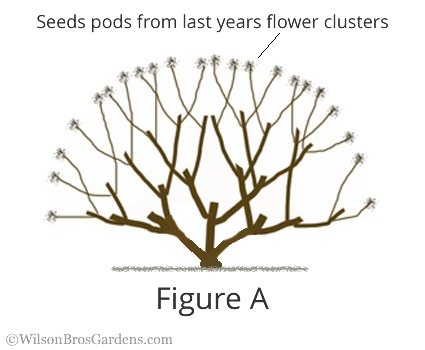The method for pruning a dwarf crape myrtle shrub is different than for pruning taller crape myrtle trees.
Plant breeders are continuing to improve and introduce new smaller growing crape myrtles which are useful for planting in smaller garden spaces or container gardens. They look great just about anywhere in a sunny location. When cared for properly they provide magnificent color during the summer months as a border, in mass plantings, as part of a perennial garden, or in containers.
An annual pruning of your dwarf Crape Myrtle shrubs can create a fuller bush with a heavier bloom.
Pruning Instructions
The methods of pruning dwarf crape myrtle range from easy to not at all. For starters, the plants really don’t require pruning - they have a slower growth rate than their larger growing cousins and usually have a good natural form all on their own. That said, I usually do at least a light annual pruning on mine.
If your plants are full and dense, I'd suggest leaving them alone, or maybe just use hand pruners to snip off the old flower/seed heads from the previous season.
When To Prune
Late Winter - You'll want to prune dwarf crape myrtle shrubs in late winter or early spring, before or just when new leaves begin to emerge. That said, broken or stray branches that spoil the shape of the crape myrtle can be removed any time of year.
Summer Pruning - Deadheading (the removal of faded flowers) can be done during the flowering season to encourage rebloom from summer through fall on some varieties. Either way, it won't hurt to deadhead spent flower clusters. To remove a faded flower cluster, simply snip it off at its base with a pair of hand pruners.
How To Prune
If your dwarf crape myrtle is young and sparsely branched, with maybe just a few widely spaced stems/branches, you might want to give it a pruning to make it grow more dense. If so, use a pair of bypass hand pruners to cut these long branches back by one-quarter to half their height. Cut all stems in a way that the plant will form a nice mounded or rounded shape when the plant fills out with foliage. In other words, don't just "flat-top" it.
Keep in mind that wherever you make a cut on a branch two or more new branches will emerge from just beneath where you made the cut. So, when you're pruning the following year in late winter, you can make your cuts several inches above where you pruned the previous year. This pruning method will double the number of branches every year, which also doubles the number of blooms. After a few years of pruning like this you shouldn't have to prune at all except to remove a stray or broken branch - the plant will keep a nice, dense form all on its own.
Below are some diagrams that show how we prune the established crape myrtle shrubs in our gardens. As mentioned, we prune annually in late winter for several years in a row and then usually cease the annual pruning after that to allow the plant to grow naturally.




